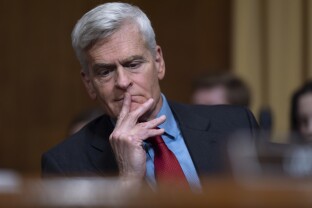Louisiana’s new primary system could make it harder for moderates to win — and push Sen. Bill Cassidy to the right.
The state’s new closed-primary system is another complication in an already fraught potential reelection bid. Cassidy is under pressure from conservatives over his confirmation votes, particularly whether he will support Robert F. Kennedy Jr. for health and human services secretary, and alleged lack of loyalty to President Donald Trump after voting to impeach him in 2021.
Backers of the primary system change told NOTUS it wasn’t meant to root out moderates. But it could hurt candidates like Cassidy, state political experts said.
“This was done to elect people who were more consistent in their conservative philosophy,” said Robert Hogan, a professor of political science at Louisiana State University. “They don’t call it the Bill Cassidy Election Reform Act, but I think a lot of them, in their mind, that’s who they have in their head when they’re thinking about this.”
Cassidy was opposed to changing the primary system, arguing it would be too costly and would disfranchise independent voters. His 2026 campaign declined to comment on whether the primary changes would affect his race, saying it’s too early to speculate.
Cassidy easily won reelection in 2020 under the previous primary system.
“In this instance, you don’t have the same voting base that has elected him, because Democrats and independents could vote in our primaries previously because they were jungle primaries,” Lionel Rainey III, a Louisiana political consultant who’s not involved in the Senate race, told NOTUS. “So his voting base has changed, so that could make a very big difference in what happens in this race.”
Proponents of the closed primaries, which include lawmakers from both sides of the aisle, insist the change wasn’t targeted at Cassidy or anyone else.
Louisiana state Rep. Julie Emerson, a Republican who sponsored the closed-primary bill that passed the legislature in a special session last year, told NOTUS she’s been wanting to close the state’s primaries for a while. (Louisiana closed its congressional primaries in 2008 and 2010, but changed back to open primaries afterward.)
This time, Gov. Jeff Landry was on board.
“There’s certainly a lot of theories out there as to the timing, but really the timing was, we had a governor who was going to support it and sign the legislation, and we had plenty of legislators who were interested in it,” Emerson said.
Emerson acknowledged that there was speculation the new system would “make for more conservative candidates, more liberal candidates.”
“I’m not sure that that’s always the reality,” she added.
U.S. Rep. Cleo Fields was a state senator at the time and was the only Democrat in that chamber to vote for the bill. For him, it was more about getting an earlier election and having congressional elections that more closely resembled the two-party system legislators encounter in Washington.
“It’s not gonna make it no more partisan than it is now,” he said.
Cassidy already has one primary challenger, and his vote on the Kennedy nomination is under intense scrutiny back at home. Landry and other high-ranking Republicans have written to the senator urging him to vote for the nominee and warning he could face repercussions if he does not.
Cassidy voted to advance Kennedy out of committee. The final vote for confirmation is expected soon.
Rainey said he still sees Cassidy as the front-runner because of his incumbency, particularly if he gets Trump’s endorsement.
“Senator Cassidy is a strong, strong candidate,” Rainey said. “It’s very rare that you see incumbents defeated. But this is a new voting base that will be voting in this primary, because, for the first time in a very long time, our primaries are closed up. So it’s going to be very interesting to see how this transpires.”
—
Helen Huiskes is a NOTUS reporter and an Allbritton Journalism Institute fellow.
Sign in
Log into your free account with your email. Don’t have one?
Check your email for a one-time code.
We sent a 4-digit code to . Enter the pin to confirm your account.
New code will be available in 1:00
Let’s try this again.
We encountered an error with the passcode sent to . Please reenter your email.


